QuestionQUESTION: My friend rescued a Russian tortoise 6 yrs. ago and was diagnosed with entamoeba. The vet put her on a medication at that time. 3 days ago she was diagnosed with the parasite again. My friend provides a nutritional diet, clean habitat and plenty of sun and exercise. I've been trying to do some research for her on this particular parasite, but can not find any answers. Can you please educate me on this matter. Example; Is it possible to stay dormant for years? Can it live outside of a host? For how long? If so, what kind of surfaces can it survive on? Are there any supplements or herbs that can help?
Thank you,
Karen
ANSWER: Hi Karen,
Entamoeba is something that doesn't seem to be too terribly common in Russian tortoises. Most of the cases I've read about were in newly imported star tortoises. It's not usually as serious in tortoises as in other reptiles--tortoises are able to manage fairly high levels, whereas other reptiles can become seriously ill. It's possible that the entamoeba wasn't entirely eradicated by the original treatment, and it took this long for the levels to build back up again. A negative fecal doesn't necessarily mean the parasite is 100% gone, but levels are low enough to not show in samples and thus are unlikely to cause a problem. If there was any recent stressor for the tortoise--change in diet, environment, habitat, etc.--it might have caused a parasite bloom. Treatment with Flagyl (metronidazole) is effective, but it's a good idea for your friend to keep her tortoise on clean newspapers or paper towels during treatment and change the newspapers as soon as possible after the tortoise defecates, in order to prevent any possible reinfection. This will mean keeping the tortoise in a dryer environment than is advisable, so she should soak him more often than usual (probably every other day).
Most parasites (or their eggs) can live outside a host, although some need an intermediary host. Entamoeba can live in the soil, on plants, etc., but as I said, I wouldn't be surprised if this is from the original infection. A healthy Russian can usually handle a lower level of parasites without problems. I don't run fecal checks on my tortoises on a regular basis, but instead watch for normal behavior and appetite. If anything seems off, then a check if warranted. Is the tortoise showing any signs of distress such as lethargy or loss of appetite?
Hoped this helped. There really isn't a whole lot of information on it, but it's not serious. If you can provide more information on exactly how she has her tortoise set up, diet, etc. I can advise you on whether any minor changes can be made, but I don't think this is something to be too concerned over.
---------- FOLLOW-UP ----------
QUESTION: Thank you for responding so quickly. The info so far is very helpful.
Here is more info. The tortoise habitat is extremely nice, an open wood box structure lined with plexy for easy cleaning with a Zoo Med power sun, heat rock, water dish and drift wood and rocks for climbing. She feeds her Grassland, romaine lettuce and assorted greens and veggies. She gets a splash of calcium and ground pumpkin seeds. Weather permitting, she receives outside sun and exercise.
She is always a very good eater and will eat almost anything. So, when she turns up her nose at food we know something is wrong. That's how we knew to take a fecal sample to the vet.
Thank you again for your immediate response.
AnswerHi Karen,
Her setup sounds good. The Powersun is an excellent UVB/heat bulb. The only suggestions I would make would be to make sure the substrate is something that holds some moisture (I use a 50/50 mix of coir and playsand), and maybe tweak the diet a bit. Ideally, the diet should be leafy greens (turnip if you can find it, mustard, kale, collards, spring mix, etc.) and weeds (dandelion, chicory, sow thistle, mallow, plantain, hawkbit, plus nasturtiums, violas, abutilon flowers, etc.). Romaine should be limited as it's not very nutritious and tends to be addictive, and best to avoid veggies because they tend to be higher in sugar, which is something that can trigger parasite growth since Russians don't have a digestive system that handles sugar well. If at all possible, I'd suggest building an outdoor pen for spring to fall and planting it with tortoise-friendly weeds. Russian tortoises are pretty hardy and don't mind being outside in somewhat cooler weather once they're acclimated to it. They can certainly handle being outdoors in 65 degrees and above, and mine are active into the 50s if there's some sun for basking. I think being able to spend a good portion of the year outdoors helps to keep them healthy.
She does sound otherwise healthy, so I don't think your friend needs to be too concerned, and she should be commended for taking such good care of her tortoise!

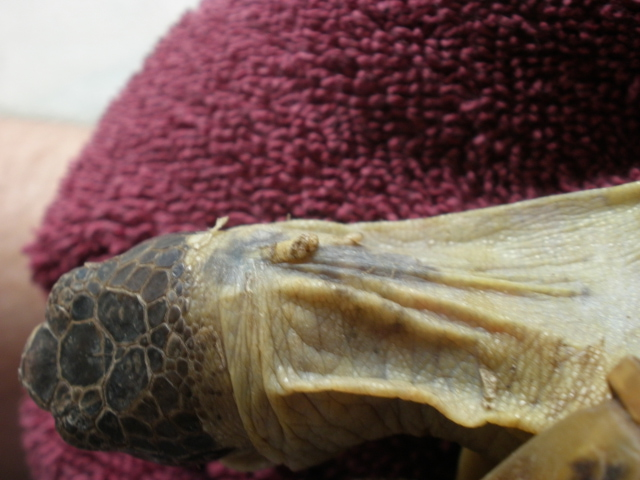 Russian Tortoise neck discoloration
Question
Neck 1 Neck 2
I have a Russian to
Russian Tortoise neck discoloration
Question
Neck 1 Neck 2
I have a Russian to
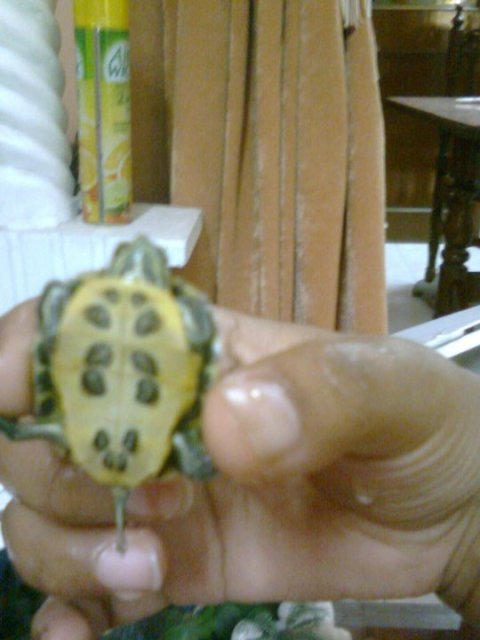 turles pregnancy...
Question
gangster
i have bought a red eared slider turt
turles pregnancy...
Question
gangster
i have bought a red eared slider turt
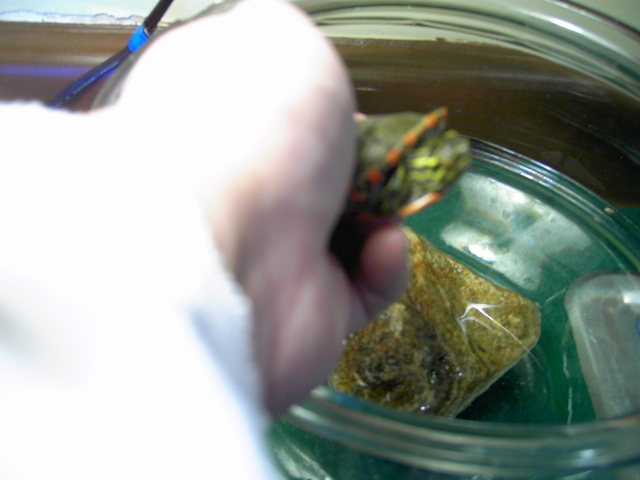 painted turtle,yellow/green eyes
Question
mable eyes
We have two painted turtles,
painted turtle,yellow/green eyes
Question
mable eyes
We have two painted turtles,
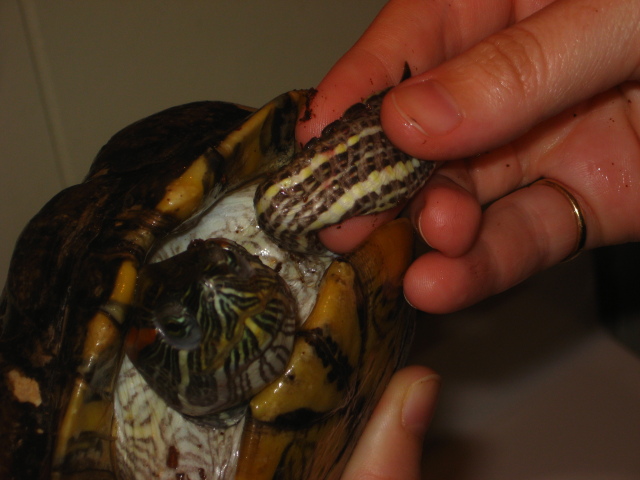 red eared slider shell rot
Question
turtles leg
We have a red eared slider, about
red eared slider shell rot
Question
turtles leg
We have a red eared slider, about
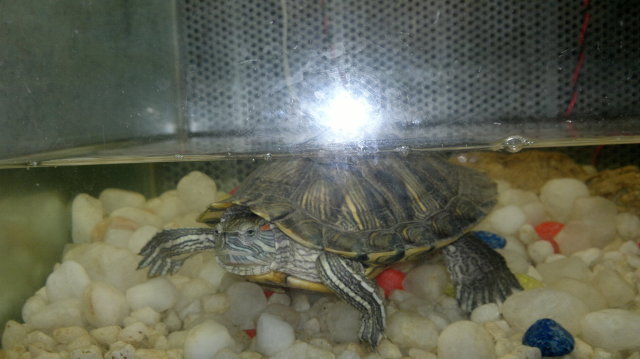 my tortise has stop eating
QuestionQUESTION: I am having 1 tortoise since 1 year b
my tortise has stop eating
QuestionQUESTION: I am having 1 tortoise since 1 year b